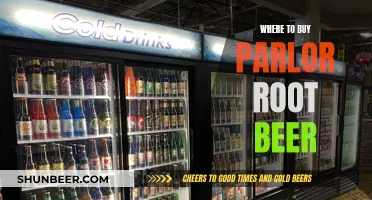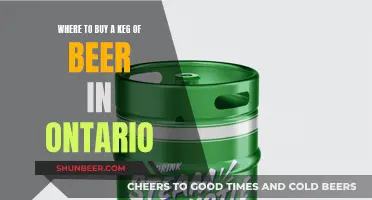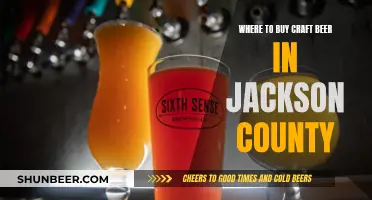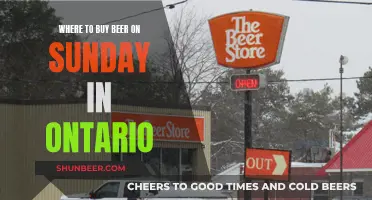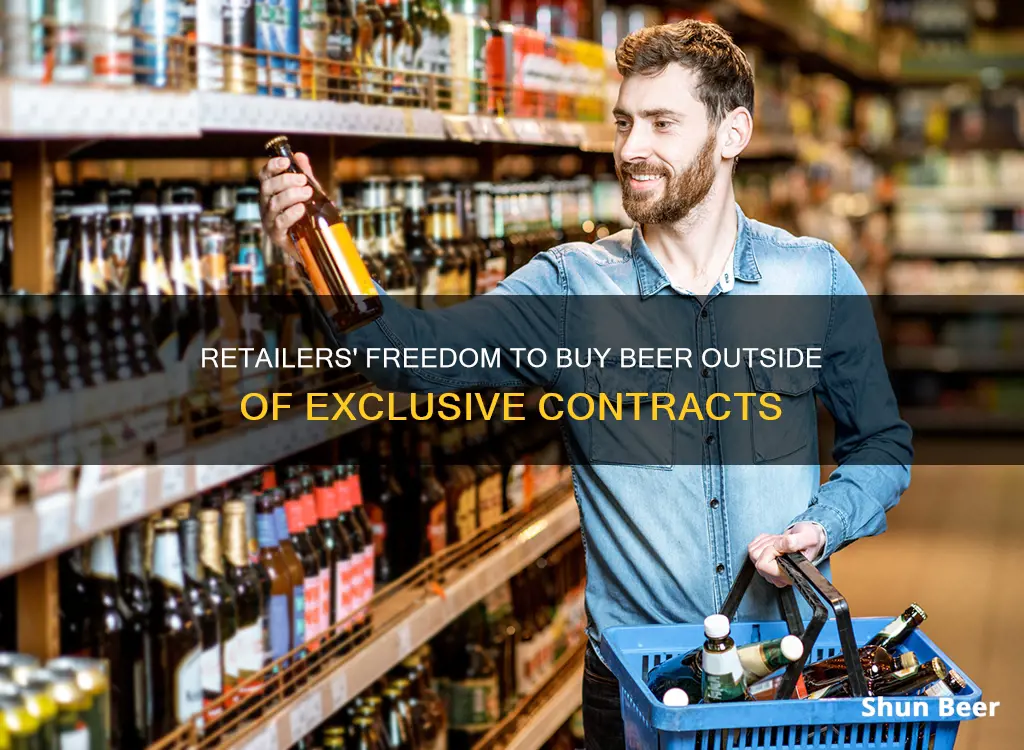
Beer distribution is a complex process that varies from state to state in the US. Generally, a three-tier system is followed, where beer is distributed from the manufacturer to a wholesaler and then to a retailer. This means that retailers typically buy beer from wholesalers or distributors rather than directly from the brewery. This system is designed to prevent vertical integration and maintain a fair market.
Retailers are subject to specific regulations, such as maintaining records of beer purchases and sales and registering with the Alcohol and Tobacco Tax and Trade Bureau (TTB). They are also required to obtain a wholesaler's basic permit if they intend to sell to other retailers.
While the three-tier system is the standard, there are some exceptions. In some states, self-distribution is allowed, where small breweries can sell directly to retailers without going through a wholesaler. Additionally, some retailers may have their own in-house brands, which could involve purchasing beer from a microbrewery and selling it under their brand name.
The pricing of beer for retailers also varies and is influenced by factors such as volume discounts and the cost of maintaining a retail storefront. Ultimately, the retail price of beer is determined by what the retailer chooses to charge, taking into account their costs and desired profit margin.
| Characteristics | Values |
|---|---|
| Beer distribution laws | Vary from state to state in the US |
| Beer distribution procedure | The three-tier system: beer producers sell to wholesalers, who sell to retailers |
| Self-distribution | Permitted in some states, with varying restrictions |
| Beer franchise laws | Control the relationship between brewer and wholesaler, vary from state to state |
| Beer franchise laws | Make it difficult for breweries to terminate contracts with distributors |
| Beer franchise laws exemptions | Some states exempt breweries producing under a certain volume |
| California beer laws | Some of the most accommodating in the country |
What You'll Learn

Beer distribution laws vary from state to state in the US
Beer distribution laws vary significantly from state to state in the US. The Twenty-first Amendment to the US Constitution grants each state and territory the power to regulate intoxicating liquors within their jurisdiction.
The beer industry is one of the most highly regulated in the United States, and the laws on distribution procedures vary from state to state. Many states require the manufacturer, the wholesaler, and the retailer to be completely independent of one another with no common ownership, thus prohibiting self-distribution. However, some states blur the three-tier system by allowing retailers to buy beer directly from manufacturers, and some states allow beer manufacturers to own their own legally distinct distribution companies.
For example, California is currently one of the more generous self-distribution states, allowing licensed California retailers to purchase alcoholic beverages for resale from licensed California beer wholesalers or manufacturers regardless of the production level. In contrast, Mississippi law states that only licensed Mississippi wholesalers may bring beer into the state; any other business or individual who brings beer into Mississippi may be subject to fines or jail.
Federal laws and regulations also apply to beer distribution in the US. For example, retail dealers of beer must comply with certain requirements of federal laws and regulations. Failure to comply with these requirements carries severe penalties and renders the dealer liable to criminal prosecution.
Buying Beer on Easter Sunday in Georgia: What's Allowed?
You may want to see also

The three-tier distribution system
The three tiers are:
- Importers or producers: Tier 1 involves all producers, including brewers, distillers, vintners, and importers of foreign alcoholic beverages. At this level, the products are manufactured and then sold to a distributor, generally at a 50% price increase.
- Distributors or wholesalers: Distributors are at the intermediate tier and handle the logistics such as storage, transportation, and marketing of the products. They also offer a network of contacts and relationships with retailers.
- Retailers: Retailers are the last tier before reaching consumers and include licensed locations like bottle shops, liquor stores, restaurants, and bars. They ensure that alcoholic beverages are only sold to those of legal drinking age.
The basic structure of the system is that producers can only sell their products to wholesale distributors, who then sell to retailers, and only retailers may sell to consumers. This is intended to limit producers' control over and promotion of the retail sale of their products, and to prevent "disorderly marketing conditions".
While the three-tier system is the bedrock of the US alcohol regulatory structure, there are variations in alcohol laws and the nature of the system from state to state. Some states, for example, allow retailers to buy beer directly from manufacturers, and some states allow a beer manufacturer to own its own legally distinct distribution company.
Red Dog Beer: Still Available for Purchase?
You may want to see also

Self-distribution laws
In the United States, the distribution of beer is a highly regulated process that varies from state to state. The three-tier distribution system, implemented after the repeal of prohibition, generally requires beer producers to sell to wholesalers, who then sell to retailers. This system limits the control that beer producers have over the retail sale of their products. While around half of the states require strict independence between the three tiers, the other half allow for some blurring of these lines.
Some states permit retailers to buy beer directly from manufacturers, and some even allow beer manufacturers to own their own distinct distribution companies. A smaller number of states allow self-distribution regardless of capacity, while others set an upper threshold on self-distribution based on annual barrel production.
For example, California is considered one of the more generous self-distribution states, allowing licensed California retailers to purchase alcoholic beverages for resale from licensed California beer wholesalers or manufacturers without any restrictions on production level. This gives breweries in California greater freedom to establish their brand and conduct business without relying on third-party distributors.
It is important to note that the distribution of beer involves a long list of complicated requirements that must be fulfilled before beer can be distributed and sold in any state. These requirements include licenses, excise taxes, reporting procedures, and franchise rules, among others. As such, it is crucial to consult with legal professionals who can provide specific guidance on the distribution laws and regulations in each state.
Buying Beer on Christmas in Tennessee: What's the Deal?
You may want to see also

Beer franchise laws
While the three-tier system is the general rule, there are variations among the states. Some states require complete independence between the manufacturer, the wholesaler, and the retailer, with no common ownership, while other states blur the three-tier system by allowing retailers to buy beer directly from manufacturers. Some states even allow beer manufacturers to own their own legally distinct distribution companies. About half of the states set an upper threshold on self-distribution, with a smaller number allowing self-distribution regardless of capacity.
Retail dealers of beer must comply with certain federal laws and regulations. They must register with the Alcohol and Tobacco Tax and Trade Bureau (TTB) and amend their registration if there is a change in the place of business or ownership. Retail dealers who sell to other dealers must register as wholesale dealers and obtain a wholesaler's basic permit under the Federal Alcohol Administration Act. They may only purchase distilled spirits from wholesale dealers, proprietors of distilled spirits plants, administrators or executors disposing of assets, or dealers selling their entire stock. Retail dealers must also keep detailed records of all spirits, wine, and beer received and sold, and their premises and stock are subject to inspection by TTB officers.
Utah Beer Buying Hours: Time Restrictions Explained
You may want to see also

The four-tier distribution system
In the United States, the distribution of alcoholic beverages is carried out through a three-tier system, which was established after the repeal of Prohibition. The three tiers are:
- Importers or producers: distillers, brewers, winemakers, and importers.
- Distributors or wholesalers: the middlemen who buy from the producers and sell to the retailers.
- Retailers: restaurants, grocery stores, pubs, bottle shops, etc., who sell directly to the consumers.
The three-tier system is designed to limit producers' control over the retail sale of their products and prevent "tied houses" and "disorderly marketing conditions". It also encourages competition and prevents monopolies by distributorships.
However, there are some exceptions and variations to the three-tier system. Some states, known as alcoholic beverage control states, maintain a monopoly on the distribution tier, and in some cases also the retailing tier. For example, in Michigan, producers sell to the state distributor, who then sells to private retail outlets. On the other hand, some states blur the three-tier system by allowing retailers to buy directly from manufacturers, and some states permit manufacturers to own distinct distribution companies.
One notable exception to the three-tier system was the state of Washington, which did not require any form of the three-tier system until 2011. However, in 2012, Washington transitioned to a heavily taxed private retailing system, which still resulted in a three-tier-like structure due to exclusive marketing agreements between producers and distributors.
Another exception was Oklahoma, which previously had a four-tier system for package sales of beer above 3.2% alcohol by weight (4.0% by volume). In this system, brewers were required to sell to brokers, who then sold to distributors. However, in 2018, Oklahoma eliminated the broker tier, bringing it in line with the three-tier system of the rest of the country.
Retail dealers of alcoholic beverages must comply with certain federal laws and regulations, enforced by the Alcohol and Tobacco Tax and Trade Bureau (TTB). These laws cover areas such as registration, requirements for selling to other dealers, closures on bottles, refilling and reusing bottles, prohibited purchases, record-keeping, and inspection by TTB officers.
Lucky Buddha Beer: Where to Buy the Beverage
You may want to see also
Frequently asked questions
Yes, in some states, retailers are allowed to buy beer directly from manufacturers. In fact, only 16 states and the District of Columbia don't allow self-distribution of beer.
In less-populated areas of some states, larger retailers are allowed by law to act as distributors to smaller retailers, creating a four-tier distribution system.
Yes, retailers can buy beer from distributors and then sell it to the public through bars, restaurants, and stores.


